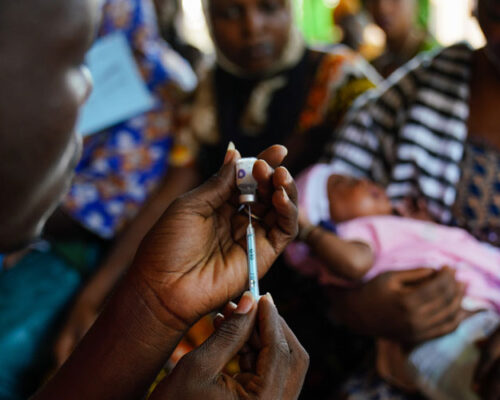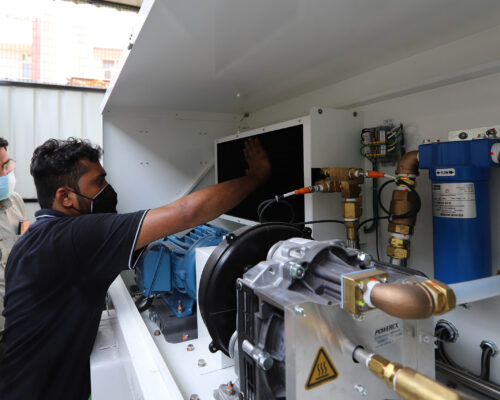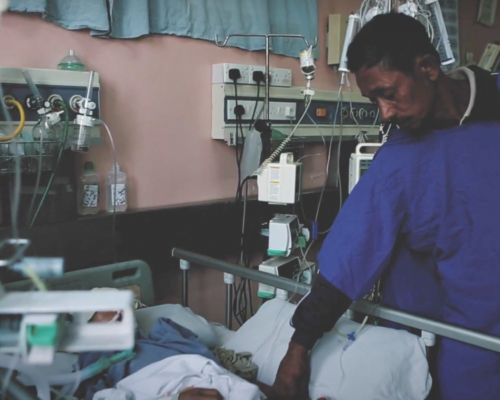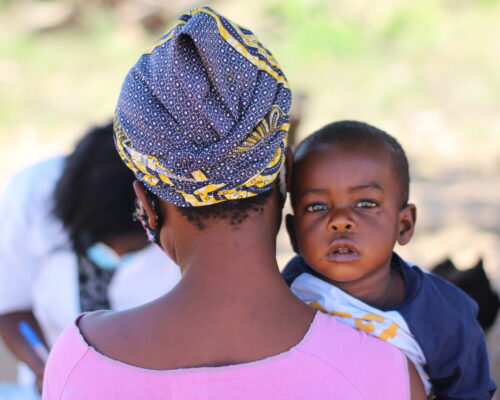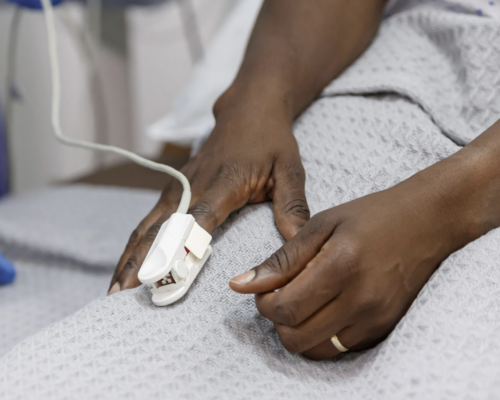
COVID-19
COVID-19 caused a massive burden of respiratory infections around the world, pushing health care systems to breaking point and disrupting routine health services. More than 7 million COVID-19 deaths have been reported to the World Health Organization (WHO), but the true death toll could be more than three times higher. WHO-reported COVID-19 deaths increased all-cause pneumonia deaths to a massive 6 million in 2021. No other infection causes anywhere near this burden of death.
A lack of equitable access to vaccines, diagnostics, and medicines is the primary reason the COVID-19 response in low- and middle-income countries (LMICs) lagged so far behind. Nowhere was this disparity more evident than in the case of medical oxygen. Access to medical oxygen had been a serious but neglected challenge in LMICs for decades and most countries entered the pandemic ill-equipped to respond to the massive demand for oxygen.
As the need for medical oxygen surged along with COVID infection rates, hospitals ran out of medical oxygen or came perilously close in every region of the world. Forced to search for oxygen on the private market, families faced high out-of-pocket costs. If they could not find oxygen, which happened in many countries, their loved ones died.
The international effort to help LMICs increase oxygen supplies kicked in during the first quarter of 2021 and was coordinated by the ACT-Accelerator (ACT-A) Oxygen Emergency Taskforce, co-chaired by Unitaid and the Wellcome Trust. Since its establishment, the taskforce has provided around $US 1 billion worth of oxygen supplies to more than 100 countries, including liquid oxygen, oxygen plants, and concentrators. It has brought the largest oxygen suppliers to the table and mobilized a network of non-profit agencies with oxygen expertise to support LMIC health ministries and governments.
The oxygen crisis is far from over. With patients still dying for lack of access to medical oxygen in many countries, and a 66% chance of another respiratory pandemic in the next 25 years, the taskforce will continue its vital work as the Global Oxygen Alliance, led by Unitaid, The Global Fund, PAHO and the Africa CDC. The Global Oxygen Alliance needs to mobilize billions more to continue its work. G20 nations and private philanthropists are well-placed to strengthen the international oxygen response enabling countries to make faster progress to achieving the Sustainable Development Goals for health and fortifying their health systems to be ready for the next pandemic.
Investing in oxygen will save lives now – especially for newborns and children with pneumonia, adults with infectious and chronic conditions, and patients requiring surgery – and better prepare countries for the next pandemic.
COVID-19 Oxygen Needs Tracker
Medical oxygen access has been a long-neglected element of health systems, despite being an essential treatment for a wide range of diseases and conditions. The COVID-19 pandemic exposed the vital role of medical oxygen as a life-saving therapy for patients struggling to breathe when so many health facilities were unequipped to meet the rising demand.
Almost half of all hospitals in low-resource settings have an inconsistent supply of medical oxygen, or lack it entirely, according to WHO. More than ever, timely and robust planning for reliable oxygen delivery is needed to protect and save lives.
Critical questions
During the COVID-19 pandemic, many governments and their national, regional, and international partners struggled to respond to the tidal wave of patients needing respiratory care, and ensure that health systems continued to function for non-COVID patients.
During this period, the Every Breath Counts Coalition met weekly to strategize and mobilize solutions to meet the rising needs across Latin America, Asia, Africa, the Middle East, and parts of Eastern Europe. We invited experts to join us to answer tough questions.
Below is a record of some of the most critical questions and their answers. We thank the many experts who joined us over this intense period to share their expertise and candid views on the many ways health systems need to change to cater to the needs of patients in respiratory distress, no matter the cause.
Q: How to protect maternal, newborn, child and adolescent health and nutrition services in low- and middle-income countries during the COVID-19 pandemic?
Read answer from John Borrazzo, Senior Health Specialist at the Global Financing Facility
Q: How do we prioritize invasive versus less-invasive respiratory therapies in low-resource settings?
Q: How can international actors best support local manufacturing of WHO-recommended COVID-19 technologies, where appropriate and feasible?
RESOURCES
Every Breath Counts
- Oxygen Partner List
- Every Step Counts
- COVID-19 Oxygen Needs Tracker (with PATH and CHAI)
- US Government support needed to finance COVID-19 oxygen emergency
- Joint Statement on Oxygen to G7
- Oxygen Statement to G20
- The Safety of Oxygen for Medical Use
- Letter to LMIC Health Ministers – Accessing International Financing for Medical Oxygen
- PSA Plant ‘Find & Fix’ Map(with Direct Relief)
- COVID-19 Summit, UN General Assembly
- Calling on G20 to contribute to the multilateral oxygen emergency response
- Joint Statement with Africa CDC calling on EU to co-invest in medical oxygen in Africa
- ACT-A Emergency Taskforce One Year On…
- ACT-A Oxygen Stories Campaign
- Open Letter: Oxygen Revisions to the International Pharmacopoeia
- Response to 2nd Global COVID-19 Summit
- 50 Ways to get Answers to your Oxygen Questions
- Global Fund Replenishment & Access to Medical Oxygen
- Launch of the Lancet Global Health Commission on Oxygen Security
- World Bank Pandemic Fund & Access to Medical Oxygen
- WHO Oxygen Resolution a Major Milestone for Access
- Landmark WHA adoption of oxygen resolution & launch of Global Oxygen Alliance
- Medical Oxygen Industry Roundtables – 25 September 2020, 9 December 2020, 9 June 2021, with the Access to Medicine Foundation
Clinton Health Access Initiative (CHAI)
FHI 360 (EpiC Program)
- Oxygen Quality Assurance
- Assessing the Medical Oxygen Ecosystem: Tools from National to Primary Health Care Levels
- Overcoming challenges to ensure access to medical oxygen
- Planning guide: Setting up liquid oxygen (LOX) systems in hospitals in low and middle-income countries
Gasworld
Global Fund
- Global Fund Investment in Medical Oxygen Infrastructure Launches in Kenya
- COVID-19 oxygen equipment financed by the Global Fund
- Project Boxer (PSA plant support with Build Health International)
- Medical oxygen systems compliant with Global Fund requirements
- List of medical oxygen consumables
- The Global Fund Joins Partners in Committing to Address Large Shortfalls in Oxygen
- COVID-19 is causing a devastating oxygen crisis
- COVID-19 Allocations & Funding Request Tracker
- Pandemic or Not, Medical Oxygen Remains Essential, Peter Sands, Project Syndicate
Jhpiego (RISE Program)
Pan American Health Organization (PAHO)
- Recommendations for the adoption and procurement of pressure swing adsorption oxygen generator plants (Spanish, Portuguese, French)
- Good Practices in the Rational and Effective Use of Oxygen (Spanish, Portuguese, French)
- Basic Course for Planning and Managing Medical Oxygen
- COVID-19 Basic Manual on oxygen supply systems
- Ten Videos on the Sustainable Use of Oxygen
PATH
- COVID-19 Respiratory Care Response Coordination project
- Improving access to tools that detect severe illness (TIMCI)
- COVID-19 Catalogue of Training Resources for Health Care Workers
- Oxygen Delivery Toolkit
- Oxygen generation and storage series
- COVID-19 Facility Assessment Resources
- Respiratory Care Equipment Market Report
- Oxygen financing, Global Fund opportunities
- Global Financing Facility Oxygen Investment Case Guide
- Fixing broken oxygen equipment in Tanzania
Save the Children
- Equitable Access to Oxygen: Sustaining COVID-19 investments to protect newborns and children fighting for breath, Geneva Health Forum
UNDP
- Solving the problem of Oxygen Access In The Gambia
- The Stabilization Facility for Libya responds to COVID-19 with a Medical Oxygen Plant at Bent Baya hospital
- UNDP provides 400 oxygen concentrators to Nepal
- 36 oxygen generation plants in Pakistan
- 7 oxygen generation plants in Sudan
- Government of Japan and UNDP have joined hands to boost oxygen supply in North Eastern Region in India
UNICEF
- Oxygen Market Dashboard
- Oxygen System Planning Tool
- SPRINT Project
- Technical Specifications and Guidance for Oxygen Therapy Devices
- Supply Catalogue
Unitaid
- UN High-Level Meetings must prioritize medical oxygen to save lives, say world’s leading agencies
- Oxygen Issue Brief
- Oxygen Briefing Note
- Global Oxygen Alliance
- Announcement of COVID-19 Oxygen Emergency Taskforce
- Need to improve oxygen access has not ended with the pandemic, Philippe Duneton, Patrick Amoth, and Takeshi Akahori, Nikkei Asia
Universal Oxygen Coalition
University of California San Francisco (UCSF)
- OpenCriticalCare.org
- Oxygen Supply and Demand Calculator
- Oxygen Encyclopedia
- Oxygen FAQ
- Oxygen Image Library
- OpenOximetry.org
World Bank
- Oxygen for all, during COVID-19 and beyond
- Building sustainable medical oxygen systems in South Asia (with PATH)
- Two provinces in Nepal get oxygen
- India gearing up for next oxygen emergency
- Pumping oxygen into Somalia’s health system
- How Rwanda’s COVID response strengthened medical oxygen access
- DRC oxygen a silver lining after COVID
USAID
- USAID Advances Efforts to Expand Access to Medical Oxygen to 50 Facilities Globally
- USAID Support Strengthens Vietnam’s Access to Medical Oxygen
- USAID Provides Liquid Oxygen Systems to Vietnam’s Hospitals
- The US Provides $18 Million to Support Medical Oxygen Systems in Countries Affected by COVID-19
World Health Organization
- WHO COVID-19 Essential Supplies Forecasting Tool (COVID-ESFT) v4.1
- OPEN WHO oxygen courses
- Training videos for oxygen equipment (French)
- International Pharmacopoeia oxygen revision
- Good manufacturing practices for medicinal gases
- Inventory Survey – Biomedical equipment for COVID-19 case management
- COVID-19 Manufacturers Survey
- Access to COVID-19 Tools Accelerator (ACT-A)
Major media
Agence France-Presse (AFP): Suffering, gasping: experts warn of oxygen shortages in poorer virus-threatened nations, April 2020
The New Humanitarian: Coronavirus exposes Africa’s oxygen problem, April 2020
Associated Press (AP)
- Scarce medical oxygen worldwide leaves many gasping for life, June 2020
- Medical oxygen scarce in Africa, Latin America amid virus, February 2021
New York Times: In poor countries many Covid-19 patients are desperate for oxygen, June 2020
Bureau of Investigative Journalism (TBIJ)
- Lack of oxygen leaves patients in Africa gasping for air, August 2020
- After India, the countries on the brink of another COVID oxygen crisis, May 2021
- Explainer- How medical oxygen is made, May 2021
- Oxygen companies put profit above patients, August 2021
The Guardian
- Explainer: why is getting medical oxygen for Covid patients in some countries so difficult? April 2021
- Oxygen shortages threaten ‘total collapse’ of dozens of health systems, May 2021
- Act now to prevent oxygen shortage in Covid-hit countries, May 2021
- Oxygen shortages are killing thousands. Why aren’t we doing more about this?, June 2021
- Lives were lost’: how countries across Africa are building ‘oxygen security’, May 2023
BBC World: Coronavirus: What’s behind Latin America’s oxygen shortages?, January 2021
Financial Times
- Oxygen shortages bite in poorer countries battling Covid, February 2021
- Paul Farmer Letter: the crisis in oxygen deserves an airing, February 2021
- Critical oxygen shortage underlines severity of India’s Covid crisis, April 2021
Politico: The worldwide scramble to prevent the next oxygen shortage, June 2021
The Independent: The Unequal distribution of oxygen is one of the scandals of this pandemic, June 2021
Project Syndicate
- Ending the Permanent Respiratory Disease Pandemic, November 2021
- Breathing New Life into Medical Oxygen, May 2022
The Atlantic: A Pandemic Silver Lining in Senegal, October 2022
Devex
- How COVID-19 laid bare Africa’s medical oxygen crisis, March 2022
- Can COVID-19 breathe new life into medical oxygen innovations, May 2022
- Opinion: Adopting WHO’s oxygen resolution is imperative to save lives, March 2023
- Will the medical oxygen industry learn a lesson from COVID-19? May 2023
- Addressing the urgent medical oxygen crisis in low-resource settings, May 2023
- Opinion: 3 keys for the implementation of universal oxygen access, May 2023
- How can medical oxygen maintain the momentum it saw during COVID-19? June 2023
- Opinion: WHO oxygen resolution is an opportunity for medical gas sector, September 2023
Think Global Health
- Build an oxygen ecosystem, June 2023
- Solving for oxygen, September 2023
The Promise of Reduced Dose Pneumococcal Vaccination for Children
Pneumonia is the leading infectious cause of death in children under five and, as a result, the pneumococcal conjugate vaccine, or PCV, is one of the most lifesaving vaccines. However, just six in every ten children are protected with PCV well below the global target...
17 March, 2024A2O2 Resource Library
The A2O2 Resource Library is a platform for all things oxygen - covering every aspect of the oxygen ecosystem from planning to equipment to patient care.
10 May, 2023You paid WHAT?
For the more than 400 million adults and children who get sick with pneumonia each year, the costs of treatment can be catastrophic - as individuals and families are forced to pay out-of-pocket for healthcare. Every Breath Counts is launching a new campaign to document these crippling costs.
09 December, 2022Antimicrobial resistance and pneumonia
How do we reduce inappropriate use of antibiotics for the treatment of pneumonia and close any remaining access gaps for pneumonia patients, especially children, who are missing out?
18 November, 20222nd Global Forum on Childhood Pneumonia
The 2nd Global Forum on Childhood Pneumonia built on the momentum for action generated by the first Forum in 2020, enabling countries to rapidly reduce child pneumonia deaths and accelerate achievement of the child survival SDG.
13 November, 2022Pulse oximeters that work for everyone
There is growing evidence that pulse oximeters do not work effectively on darker skin tones. This is unacceptable. Every Breath Counts has launched a petition to change this.
10 October, 2022


